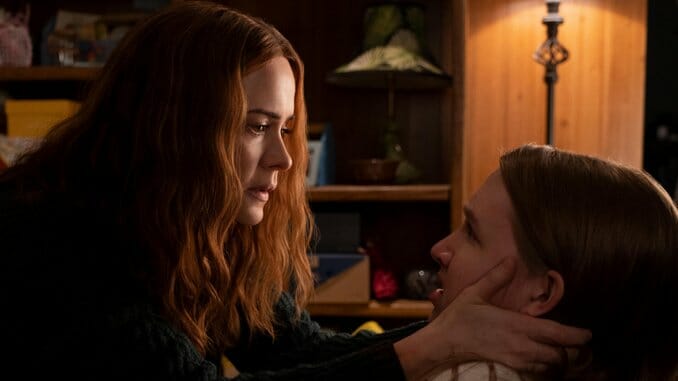Run To Hulu For Aneesh Chaganty’s New Thriller
Photos Courtesy of Hulu
Kiera Allen, the star of Aneesh Chaganty’s new thriller, Run, is a revelation. She’s an immensely talented actress: down to earth and relaxed, but vital and possessed of honest-to-goodness grit. She also uses a wheelchair, which isn’t remarkable in and of itself—she’s 1 of about 2.7 million Americans who do —save that Hollywood loves casting non-disabled actors as characters with disabilities, and Allen’s work here supposes that, in fact, Hollywood shouldn’t do that. She probably won’t revolutionize the way the industry considers casting actors with disabilities all on her own, but boy, her lived-in experience and compelling performance throws dunderheaded studio ableism into sharp relief.
Allen plays college-bound Chloe Sherman who, having suffered a difficult birth as a baby, navigates life without use of her legs. Chloe lives with her mother, Diane (Sarah Paulson), one part overprotective, one part staunch Chloe booster: She loves her daughter unconditionally, but she could stand to take a few paces back instead of hovering over Chloe’s shoulder like a drone. Their dynamic changes irrevocably when Chloe, searching grocery bags for chocolate, stumbles on Diane’s medication. Diane tries to pass it off as Chloe’s. It’s a small thing, but not small enough. A lightbulb flickers in Chloe’s brain and she starts following breadcrumbs that eventually lead her to the horrifying realization that Diane’s hiding something from her.
Under 90 minutes and without an ounce of fat, Run buzzes with anxiety even in the quietest scenes where technically all’s well but nothing’s right: Repeated sequences, like the Shermans’ ritualized mealtimes, grow increasingly uneasy as Chloe’s questions about Diane and the truth slowly evolve into suspicions and then, at last, fully blossom into horrified disbelief. What would you do if you found out the person you call “mom” may not actually be your mom at all? Earlier this month, The Craft: Legacy clumsily posed and answered the same question, but Chaganty and his Searching co-writer Sev Ohanian map Run around that fearful betrayal and give real thought to its consequences—and Chloe’s response.
In short, she suffers none of that shit and immediately sets about trying to ascertain Diane’s real identity. Watching Allen operate under the joint mental and physical strains of Chloe’s predicament is an embarrassment of tense delights: The film doesn’t sugarcoat the disadvantages her disability puts her at, but also demonstrates that a disability isn’t an impediment for a clever mind and a lifetime of experience. Chloe isn’t just a teenage girl in a wheelchair. She’s MacGyver in the body of a teenage girl who uses a wheelchair. The maneuvering and guile she uses to evade Diane, the resourcefulness she musters to break down Diane’s lies, the resilience she has doing all of this while under the influence of her “medicine”—Chloe’s too badass to let these inconveniences hold her back.
-

-

-

-

-

-

-

-

-

-

-

-

-

-

-

-

-

-

-

-

-

-

-

-

-

-

-

-

-

-

-

-

-

-

-

-

-

-

-

-








































